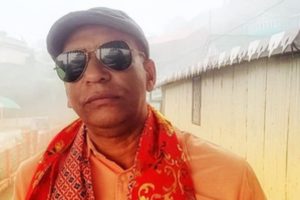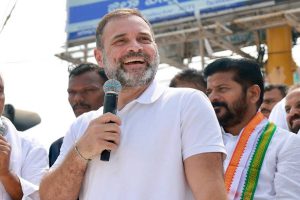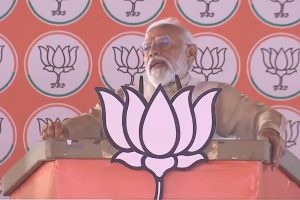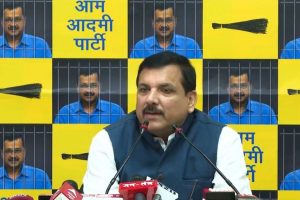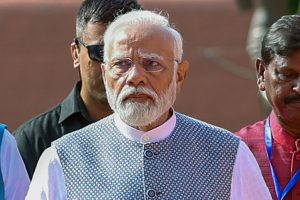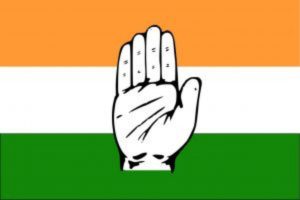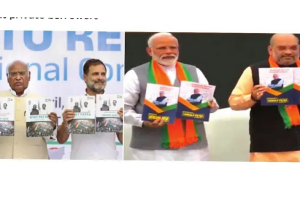At a time when the English publishing industry is booming in the country, writers in Indian languages claim that it is difficult for them to make a living through writing alone. But this has neither subdued their interest nor do they ever plan to quit writing, even if that means writing for a single reader.
The past two decades have seen a sustained growth in the consumption of literature, but most of it has been confined to English and Hindi. Poets and authors writing in other languages — Marathi, Punjabi and Odia, for instance — find the reading circles within these languages rapidly shrinking.
The result? The commercial value of their books has declined and opportunities to publish works in these languages have simultaneously reduced.
Writing is no longer the bread and butter for such writers and their livelihood largely depends on the many parallel jobs that they pursue.
Consider Maithili writer Chandan Kumar Jha, for instance. Despite having been awarded the prestigious Sahitya Akademi Yuva Puraskar 2017 for his collection "Dharti Sau Akash Dhair", there is little hope that he will ever consider poetry as a serious profession.
"I won't dare to take up writing as my profession, it is better limited to passion," the 32-year-old Jha told IANS.
Based in Kolkata, he works at a private life insurance company, and poetry — the art that he has mastered — is only a soothing balm in his leisure hours.
"A poet may be successful for the moment, but it's not necessary that his or her writings will be appreciated after a few years. Ideologies change very frequently, so does the writing pattern and their themes. So, surviving just on writing is difficult," he maintained.
Jha is not an isolated example but only one in the long list of writers and poets in regional languages, who are faced with the same challenge. They may be able to produce a fine work of literature but very few, if at all, are actually able to translate their efforts into a sustained income.
Another poet, Suryasnata Tripathy, who has also bagged the same award for his collection "E Samparka Emiti" in Odia, shared a similar view.
"There is no money in regional language writing. One of the major hurdles as a regional poet and upcoming writer is to convince the publishing house. Publishers are not so keen on taking risk in regional poetry, unless the poet is well known," said the 26-year-old poet, who is currently pursuing his PhD in microelectronics at IIT-Hyderabad.
Like Jha, he also maintained that there are few chances of success for regional writers in India and that they need to have a "parallel career" to support themselves and their families.
"There may have been writers who were only into poetry earlier but that is mainly because there was a good sale of books. Readers (in regional languages), if compared to earlier days, have certainly reduced," claimed poet Nighat Sahiba.
The 34-year-old poet from Kashmir has been bestowed with the Sahitya Akademi Yuva Puraskar for her collection "Zard Paanike Dair".
Punjabi poet Harmanjeet recalled how he was rejected by an established publishing house for his collection "Rani Tatt", which has now got him the Sahitya Akademi Yuva Puraskar.
"When the publishers were not ready to take up my writing, I took help from a friend, got it printed and reached out to book sellers," said Harmanjeet, who lives in Mansa, Punjab.
The 26-year-old poet is also a lyricist who pens for Punjabi movies.
"Initially I tried to sustain on my writing but soon realised that I cannot. The financial scenario for regional poets and writers is not so good. And there are a number of reasons behind this," Harmanjeet noted.
According to most of these poets, the reach of regional writing is limited due to the language barrier and, therefore, the sale of books is within a set boundary and population, unless translated.
"Youth particularly are more inclined towards reading in English and, therefore, the number of copies published for regional writers are less. Under such circumstances, how can a poet only depend upon his writing?" Harmanjeet asked.
Tripathy, the Odia poet, also claimed that the publishers are not ready to accept the new and more liberal style of writing in poetry and prefer the old format, which makes it difficult for the poets to get their manuscripts printed.
However, it is sheer joy to read their verses and observe their zest for expressing sentiments in verse despite all the negativities they have to cope with on a daily basis. Poetry may not be a profession but these young voices from this fine expression of literature reiterated they will continue to write even if there remains just a single reader.
"Poetry has never been for all, it was always meant for a limited audience. Although the readership might have gone down, there will always be some readers," Jha quipped.
The Sahitya Akademi Yuva Puraskar 2017, which along with a casket containing an engraved copper plaque and Rs 50,000, is a step towards recognising and supporting their craft. But certainly, a lot remains to be done.


